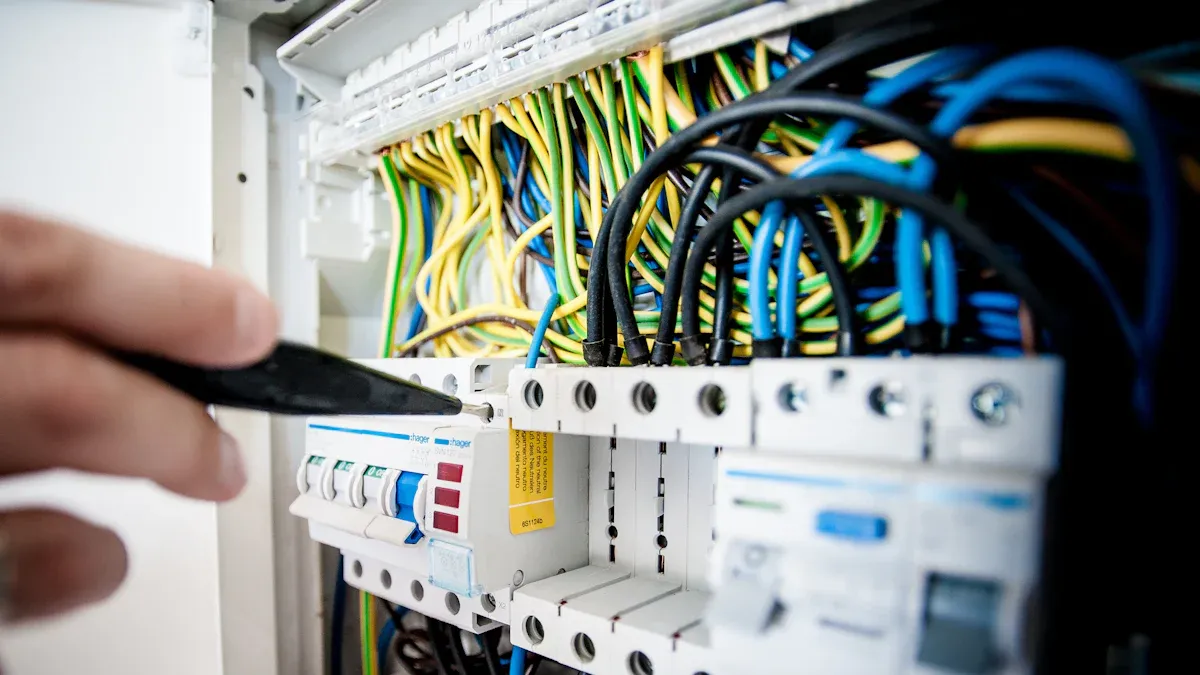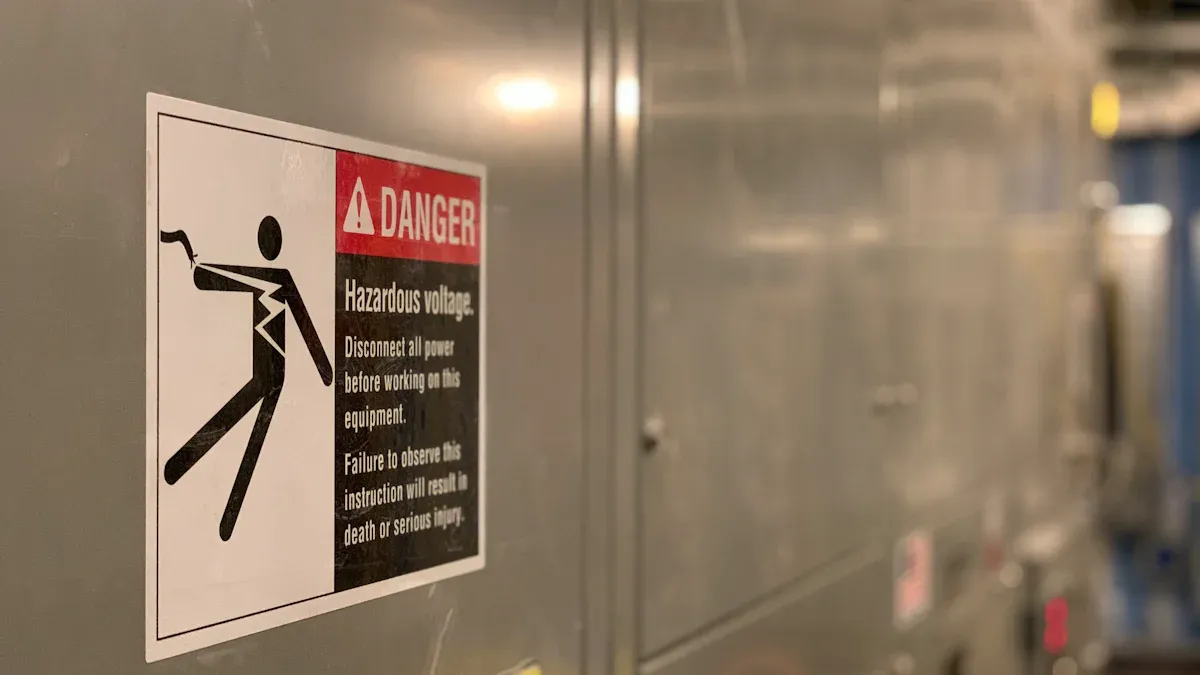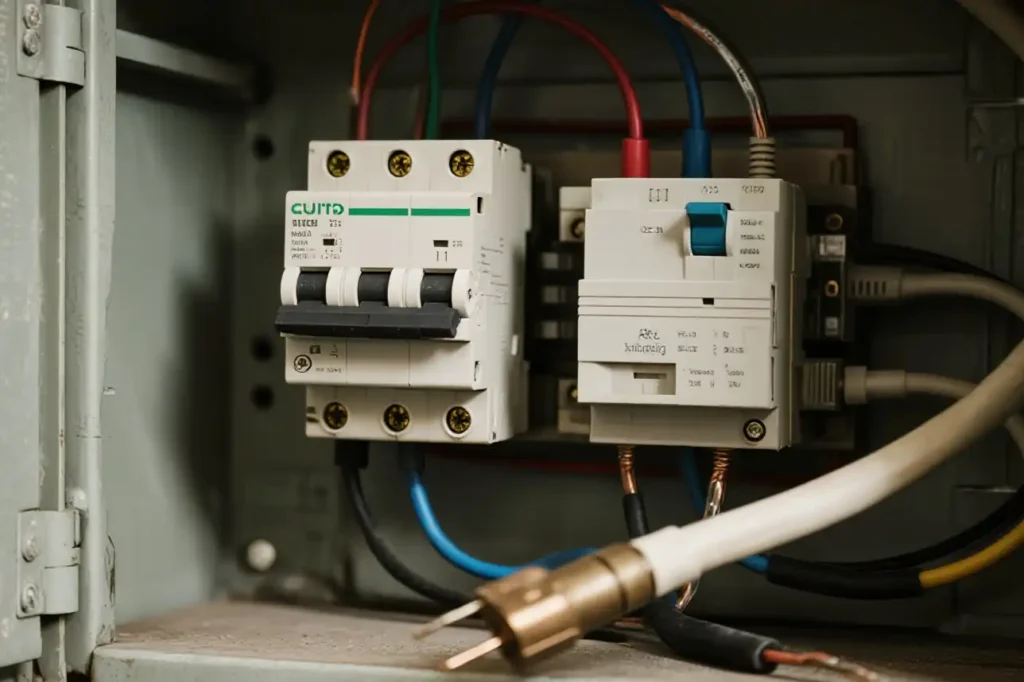You need a grounding wire for your RCBO to keep your electrical system safe. The grounding wire helps the RCBO detect faults quickly. It gives the device a stable voltage reference and protects you from electric shocks. Without proper grounding, you risk fire or injury. Many people worry about what happens if the ground is missing or installed wrong. You can feel confident when you install the RCBO with the correct grounding wire. This simple step keeps your home and family safer every day.
Key Takeaways
- A grounding wire lets extra electricity go safely to the ground. This keeps you safe from shocks and fires.
- RCBOs find electrical problems by looking for current imbalances. They do not use the grounding wire to do this.
- Good grounding helps your RCBO work well. It also makes your home safer every day.
- Always follow electrical rules and use good grounding steps. This helps you avoid danger and legal trouble.
- Check and take care of your grounding system often. This makes sure your RCBO and electrical system work well.
RCBO Function & Grounding

How RCBOs Detect Faults
You might wonder why an RCBO can protect you from electrical dangers. The answer lies in how it senses problems. An RCBO watches the flow of electricity in both the live and neutral wires. If the current going out does not match the current coming back, the RCBO knows something is wrong. This difference often means electricity is leaking somewhere, possibly through a person or to the ground.
- RCBOs do not use the grounding wire to sense these faults.
- The device looks for current imbalances, not voltage differences.
- If you touch a faulty appliance, the RCBO can detect the leak and shut off power quickly.
Tip: RCBOs combine the jobs of two devices. They act as both a circuit breaker and a ground fault detector. This makes them more sensitive and effective than older devices that needed a separate ground connection.
Role of Grounding Wire
You may ask why the grounding wire matters if the RCBO does not use it to detect faults. The grounding wire plays a different but vital role in your safety.
- The grounding wire gives stray electricity a safe path to the earth.
- It helps prevent electric shock if a metal part becomes live.
- The grounding wire does not serve as a voltage reference for the RCBO. Instead, it acts as a safety backup.
Older devices, like ELCBs, needed a strong ground connection to work. They were less sensitive and could miss some faults. RCBOs do not depend on the grounding wire for their main job. However, you still need the ground wire to protect against electric shock and fire.
Note: Even though RCBOs do not require a ground wire to operate, you should always install one. The grounding wire helps keep you safe if something goes wrong that the RCBO cannot detect, such as a loose wire touching a metal case.
A good grounding system lowers the risk of fire. If a fault sends electricity into metal parts, the ground wire carries it away. This action can trip the RCBO or another breaker, stopping the danger before it grows.
Summary Table: RCBO vs. Older Devices
| Device Type | Needs Ground Wire to Work? | Detects Current Imbalance? | Sensitivity Level |
|---|---|---|---|
| RCBO | No | Yes | High |
| RCCB | No | Yes | High |
| ELCB | Yes | No | Low |
You now see why the grounding wire is still important. It does not help the RCBO detect faults, but it gives you extra protection. You should always make sure your grounding system is in good shape.
Safety & Compliance

Electrical Codes
You need to follow electrical codes when you install an RCBO. These codes exist to keep you safe and to make sure your system works as it should. Most countries use standards like BS EN 61009. This standard does not require a separate earth connection for an RCBO to work properly. You should always check your local rules, but in most cases, the main goal is to make sure every metal part that could become live has a safe path to ground. This helps prevent electric shock and fire. If you skip this step, you risk breaking the law and putting people in danger.
Common Misconceptions
Many people believe myths about RCBOs and grounding. Here are some common misunderstandings:
- Some think every RCBO must have a separate earth wire to meet safety standards. In reality, the main standard does not require this.
- Others worry that an RCBO cannot detect earth faults if the neutral wire disconnects. While this is technically true, this situation almost never happens in real life.
- You might hear that using a separate earth wire always makes things safer. In fact, this can make wiring more complex and lead to mistakes, such as forgetting to reconnect the earth wire.
- Some installers disconnect earth wires during testing. This can cause confusion and increase the risk of errors.
You should focus on good installation practices instead of chasing theoretical risks. Insisting on a separate earth wire for every RCBO can create more problems than it solves.
Risks of Improper Grounding
If you ignore grounding rules, you put yourself and others at risk. Without a proper ground, stray electricity can stay in metal parts. This increases the chance of electric shock. Fires can also start if a fault sends current into wires or metal cases that cannot safely carry it away. An RCBO can trip and cut power, but only if the fault has a path to ground. If you skip grounding, the device may not protect you as intended. You should always check your grounding system and fix any problems right away.
RCBO Installation Tips
Grounding Best Practices
You want your electrical system to work safely every day. Good grounding practices help you achieve this goal. Always connect the grounding wire to the main earth bar in your distribution board. Make sure the wire is tight and secure. Use the correct size wire for your system. Check that all metal parts, such as enclosures and switchgear, have a direct path to ground. If you install a new RCBO, inspect the earth connections before you turn on the power.
Tip: Use a green and yellow wire for grounding. This color helps you spot the earth wire quickly during inspections or repairs.
A reliable earthing system protects you from electric shock. It also helps prevent fires by carrying stray electricity away from metal parts. You should test the earth connection with a meter to confirm low resistance. If you see rust or loose screws, fix them right away.
Troubleshooting
Sometimes you face grounding problems after installing an RCBO. You can solve many issues with simple steps.
- Measure voltages between line, neutral, and earth. For example, check L-N, L-PE, and N-PE. You should see 230V between L-N and L-PE, and 0V between N-PE if the ground relay works.
- Test the RCBO by shorting earth to the output with an insulated wire. This method shows if the device trips as expected.
- Check the type of RCBO you installed. Some types work better with LED lights or solar systems.
- Simplify your test setup. Connect the RCBO directly to a simple circuit to find grounding or tripping problems.
- Review neutral-to-earth bonding. Only bond at the first distribution board. Do not bond downstream.
- Learn about internal and external ground relays. These relays help manage neutral-to-ground connections, especially in off-grid systems.
Note: If you find high resistance or strange voltage readings, you may have a faulty earth connection. Fix these problems before you use the system.
A strong grounding system makes your RCBO more effective. You lower the risk of shock and fire. You also make your home safer for everyone.
You now understand why grounding matters for RCBO safety. Good grounding keeps you safe and helps your system meet electrical codes. Always follow best practices when you install or check your RCBO. Make sure every ground wire is secure and in good condition. When you use proper grounding, you lower the risk of shock and fire. You can feel confident knowing your home is protected.
FAQ
Why do you need a grounding wire if the RCBO works without it?
You need a grounding wire because it gives stray electricity a safe path to the earth. This wire protects you from electric shock and lowers the risk of fire. The RCBO alone cannot stop every danger.
Why does improper grounding make your RCBO less effective?
Improper grounding lets stray current stay in metal parts. This increases the risk of shock or fire. Your RCBO may not trip as quickly or may miss some faults. Good grounding helps the RCBO protect you better.
Why should you test your grounding system regularly?
You should test your grounding system to find loose wires or high resistance. Regular checks help you catch problems early. This keeps your RCBO and the whole system working safely.
Why do electrical codes require grounding with RCBOs?
Electrical codes require grounding to protect people and property. Grounding helps prevent electric shock and fire. Codes make sure you follow safe practices when you install or use RCBOs.
Why can skipping the grounding wire put your home at risk?
Skipping the grounding wire means stray electricity has nowhere safe to go. This can cause electric shock or start a fire. You keep your home safer when you always use a proper ground.
See also
Understanding RCBO Breaker Terminology Made Simple
RCBO residual current circuit breaker with overcurrent protection
Key Differences Between RCD, MCB, and ROCO Devices
RCBO and RCCB Explained for Beginners
RCBO Replaces MCB What You Need to Know



